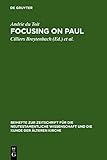Focusing on Paul : persuasion and theological design in Romans and Galatians / Andrie du Toit ; edited by Cilliers Breytenbach and David S. du Toit.
Material type: TextLanguage: English, German Series: Beihefte zur Zeitschrift für die neutestamentliche Wissenschaft und die Kunde der älteren Kirche ; Beiheft 151.Publication details: Berlin ; New York : Walter de Gruyter, ©2007.Description: 1 online resource (xiv, 443 pages) : illustrationsContent type:
TextLanguage: English, German Series: Beihefte zur Zeitschrift für die neutestamentliche Wissenschaft und die Kunde der älteren Kirche ; Beiheft 151.Publication details: Berlin ; New York : Walter de Gruyter, ©2007.Description: 1 online resource (xiv, 443 pages) : illustrationsContent type: - 9783110914559
- 3110914557
- Persuasion and theological design in Romans and Galatians
- Du Toit, A. B. (Andreas B.) -- Bibliography
- Bible. Epistles of Paul -- Theology
- Bible. Romans -- Theology
- Bible. Romans -- Criticism, interpretation, etc
- Bible. Galatians -- Theology
- Bible. Galatians -- Criticism, interpretation, etc
- Bible. Épîtres de Paul -- Théologie
- Du Toit, A. B. (Andreas B.)
- Bible. Epistles of Paul
- Bible. Galatians
- Bible. Romans
- Rhetoric in the Bible
- Rhétorique dans la Bible
- RELIGION -- Biblical Biography -- New Testament
- Rhetoric in the Bible
- Theology
- 225.9/2 22
- BS2651 .D86 2007eb
- online - EBSCO
- BC 7290
| Item type | Current library | Call number | URL | Status | Notes | Barcode | |
|---|---|---|---|---|---|---|---|
 eBook
eBook
|
Biblioteca "Angelicum" Pont. Univ. S.Tommaso d'Aquino Nuvola online | online - EBSCO (Browse shelf(Opens below)) | Online access | Not for loan (Accesso limitato) | Accesso per gli utenti autorizzati / Access for authorized users | (ebsco)557591 |
Browsing Biblioteca "Angelicum" Pont. Univ. S.Tommaso d'Aquino shelves, Shelving location: Nuvola online Close shelf browser (Hides shelf browser)
A collection of previously published essays by A. du Toit, issued on the occasion of his 75th birthday.
"Andrie du Toit, bibliography (1962-2006) "-Page 405-412
Includes bibliographical references and indexes.
Eighteen essays in English and 3 in German.
Pages:1 to 25; Pages:26 to 50; Pages:51 to 75; Pages:76 to 100; Pages:101 to 125; Pages:126 to 150; Pages:151 to 175; Pages:176 to 200; Pages:201 to 225; Pages:226 to 250; Pages:251 to 275; Pages:276 to 300; Pages:301 to 325; Pages:326 to 350; Pages:351 to 375; Pages:376 to 400; Pages:401 to 425; Pages:426 to 450; Pages:451 to 460.
In the early 1970's, due to serious epistemological flaws, the demise of traditional New Testament research paradigms became imminent. A new generation of scholars started the search for a fresh approach, based on scientifically sound principles. Working within the stimulating atmosphere of the New Testament Society of South Africa, the author was one of the pioneers in developing a new, multi-dimensional research approach for New Testament studies. The articles in the present volume, written over a period of 25 years, reflect part of this journey, as viewed from a Pauline perspective. Combining the positive aspects of the traditional biblical research paradigms with the important insights of modern linguistics, literary science, semantics and pragmatics, particularly rhetoric, the author investigates the convergence of various influences in Paul's pre-christian career. He proposes new possibilities of understanding Paul's language and style, such as hyperbolical contrasts, typical of his Semitic background. Various aspects of his strategies of persuasion are investigated, such as creating an ethos, vilification, alienation and re-identification. The majority of articles concentrate on central elements in Pauline theology: belief in the resurrection of Jesus, the centrality of grace, the in Christ and related formulae, faith and obedience, justification in Romans, Christian identity, ethics and ethos, as portrayed in Romans.









